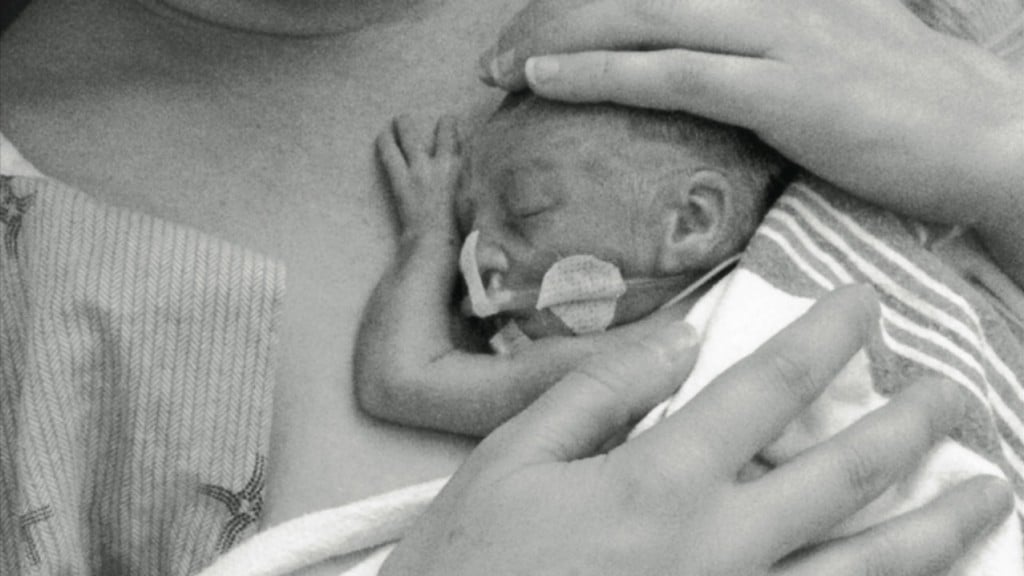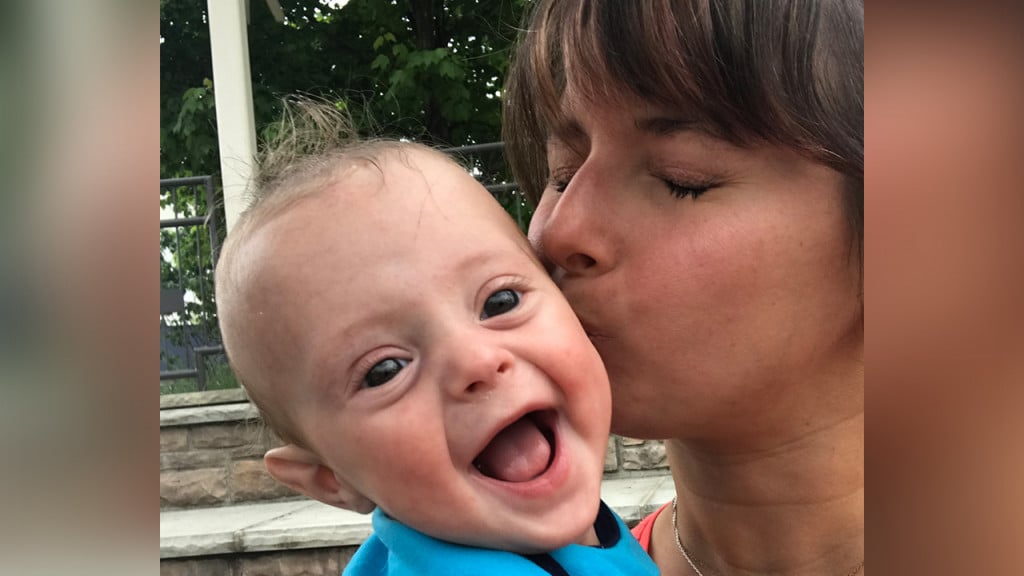Photo: Courtesy Jenna Fletcher
“Do you want kisses kisses?” I asked the almost 3-month-old baby, holding him at arm’s length.
I was always holding him at arm’s length. I was terrified—I realized later—of letting myself get attached to him.
I delivered my son, M, when I was a little over 32 weeks pregnant. His identical twin brother, N, had passed away five days before without warning. None of the doctors knew what caused N’s death.
Up to the day I found out N had passed away, the boys had been growing perfectly. Though I had gestational diabetes, rising blood pressure, and had been hospitalized for preterm labor the week before, the near weekly ultrasounds showed the babies were perfect. I had no way to prepare myself for the loss. All of a sudden, I heard the worst news any expecting mom could hear: N was gone and M was in serious danger of complications related to his brother’s death.
When my boys were born five days later, I never got to cradle M to my chest and marvel at his ten perfect fingers and toes. I didn’t get to have a moment to take him in and bask in his perfect newness. I didn’t have the exuberant joy I felt when I first held my daughter and stared at her little face that I already somehow knew.
A team of NICU doctors whisked him out of the operating room before I was even stitched up.
While my body was pleasantly numb from the spinal block, the drugs did nothing to dull the emotion of the day. People arrived to be with me, but I was disoriented from the drugs and the whole ordeal. They held my hands and tried to offer me comfort.
“It’s not your fault.”
“You did everything you could.”
“I know this sounds impossible right now, but don’t blame yourself.”
It was impossible not to blame myself.
On a day that was supposed to be so joyous all I felt was the weight of my failure to keep my son alive mixed in with the overwhelming nausea from the surgery. I wanted to be alone to wallow. Even so, I didn’t make anyone leave—I was scared to be alone with my clouded thoughts and grief. I had been fighting to push my terrible feelings down, but that day I fell into the hole I’d been standing on the edge of since learning about the death of my other twin.
I gave birth to two sons, one living but too small and sick and one born so still. I hit the bottom with a thud. Something snapped in me then. I couldn’t stop the anguished tears from pouring out in the recovery room. All at once, I worried about everything, including things I had never even thought about before. My body buzzed with an unpleasant electricity. Every cell in my body was on high alert ready to spring into action.
A few hours later, when I was finally recovered enough from the anesthesia, my sweet nurse wheeled me to the NICU to see M in his incubator. I couldn’t believe that tiny being in the box hooked up to all the monitors was mine. He was so small and fragile that he barely looked like a baby. I was surprised that I didn’t feel a rush of love for him at that time, but I figured that would change when I got a chance to hold him.
A few days later, a team of nurses gingerly transferred M to my chest, careful not to disturb the wires and tubes attached to his tiny little body. The nurse’s watchful eyes never gave us a moment to meet each other privately. The world didn’t narrow and become just me and him when I first held him. Instead it was me, him, his wires, and the nurses and their scrutiny.
I held him to my chest, and waited.
Nothing.
Instead, my fear grew. It coexisted with the emptiness and anguish and choked out my ability to be happy.
A crippling cloak of postpartum depression and anxiety, and the grief of losing a twin in the womb, left me numb.
Devastatingly, frighteningly numb.
Then there was the guilt. I already failed my son twice. First, by failing to keep N alive, and then by going into preterm labour, delivering him too early and leaving him hooked up to wires and with an uncertain prognosis. Now I couldn’t give him the overwhelming love he deserved.
What kind of mother was I?

Life in the NICU: a case study in hopeI knew that I wanted better for him. I tried. I figured I’d fake it until I made it and hoped everything would fall into place. I went to the NICU daily, juggling my visits with caring for my 4- year-old. I sat by his incubator and asked permission to hold him and feed him. I was present for care time and learned how to do diaper changes. I called the NICU at night before going to bed and checked the camera they had set up multiple times each hour we were apart.
I thought for sure once he was home and I could mother him without the constant surveillance of the NICU staff the love rush would come.
Instead his homecoming filled my emptiness with terror. My son wasn’t a baby but something precious and dangerous that I had to watch vigilantly to make sure it didn’t spontaneously combust. I analyzed his every noise and movement. If he squeaked, I was sure it meant something awful for him, from him being sick to SIDS. The sound of him crying over the monitor would make me panic. And as a colicky baby with reflux, he cried. A lot. I was always living at the edge of a full-fledged panic attack.
But I pushed myself to care for him. I knew some version of future me would regret it if I didn’t. I rocked him, read to him, sang to him. I forced myself to soak him in— his crazy determination and spunk in this impossibly small body, his milky scent, and the funny faces he made full of so much personality.
One afternoon, about six weeks after he came home when he was almost 3 months old, I was holding him and sitting in my easy chair. For one blessed moment, he wasn’t crying. I had him propped against my knees, facing me. I relished the moment of quiet after weeks of relentless crying from the both of us. His big grey eyes were fixed to my face. He was studying me, drinking me in. He almost seemed like he was saying, “Ok, Mom, time for us to figure this out. I’m game.”
The way he studied me was actually adorable. I recognized that without even needing to try, for once.
“Do you want kisses kisses?” I asked him.
Just then the corner of his mouth twitched upward slightly in almost a smile.
I pulled him in and gave his soft round cheek kisses.
As soon as I gave him the first kiss, his face lit into a smile.
Thinking it could be a fluke or gas, I held him away from me again and asked him, “Do you want kisses kisses?”
This time his head tilted towards me, as if he was propelling himself to me to get his kiss. I pulled him in again and kissed his soft cheek.
And there it was—another smile, this time unmistakeable, and just for me. And I felt it. A wave of love finally gently lapping at my battered self. It wasn’t heady, but it was there, and that was enough.
Read more:
How my heart-shaped uterus changed my birth plan
I almost died delivering my son


